For Robert Field, there is no distinction between everyday life and fishing. A true optimist with a slight Texas drawl, Field is a professional angler. But not just any type of angler. He’s one of the elite in a rapidly growing profession known as kayak fishing.
“With kayak fishing, you’re getting everywhere manually, under your own power,” says Field. “I think that makes it much more rewarding, when you have to work to get to the spot, even just to start fishing.”
For many of us, fishing is a peaceful (albeit incredibly patient) way to spend a summer. When the weather gets warmer, we pack up our poles and find a sloping, sandy spot along the bank of a river or lake. We bait, cast, and wait—beach chair and cooler never far away. We omit many of the technicalities, like knowing the exact pedigree of fish we seek or the currents of the water, and simply enjoy the act for what it is. However, for Field, it wasn’t by way of summer recreation that he was first introduced to the art of angling. His story has an entirely different origin.
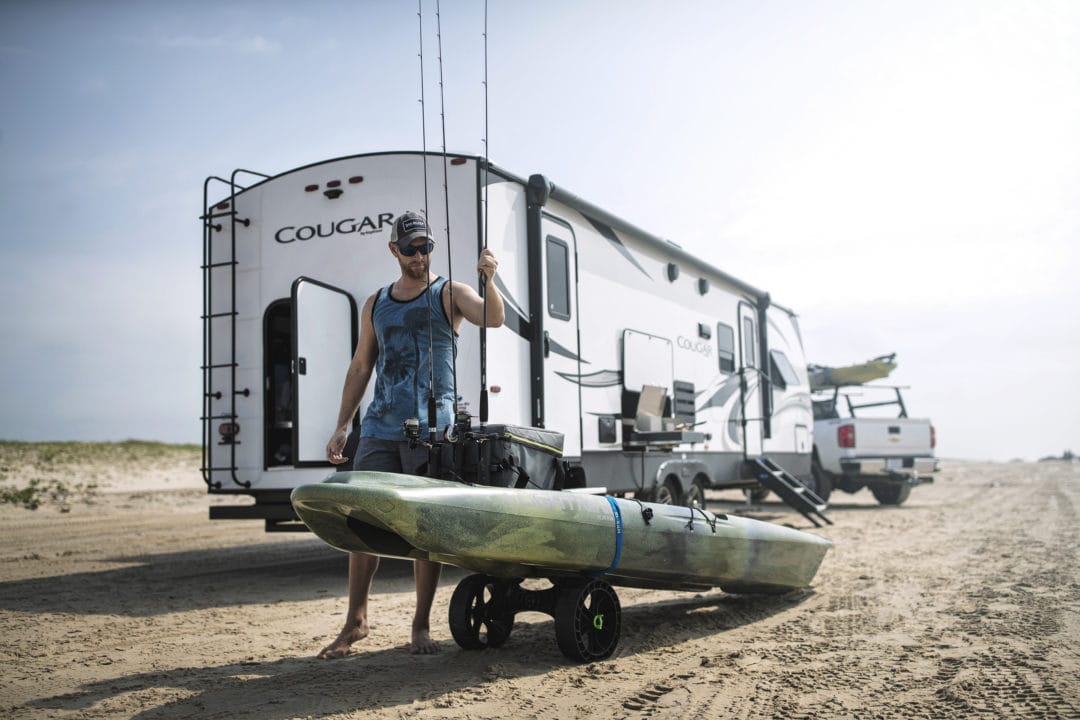
When tragedy brings new perspectives
Born in London, England, Field and his family moved to Plano, Texas when he was 11 years old. After graduating high school, Field attended Texas A&M University, where he received a master’s degree in finance. From there, he took a job on the marketing team at a large financial company.
“I was putting on a suit and tie every day, commuting and sitting in traffic for hours, countless hours,” recalls Field. “Then I would sit in a cubicle and do exactly what someone told me to do from eight to five.”
“I thought to myself, maybe all of these things that I think matter are actually not enough.”
After a few years, the corporate cycle began to wear on Field and make him feel anxious. This feeling, accompanied with the sudden death of a close family member, made Field start to question his values.
“When my uncle passed away, it kind of forced me to rethink what I valued, what I thought was important in life,” says Field. “I thought to myself, maybe all of these things that I think matter are actually not enough.”
This was a turning point—a crossroads where Field could continue down the same path or change direction and do something entirely different, something that made him feel happier.
And that something turned out to be kayak fishing.
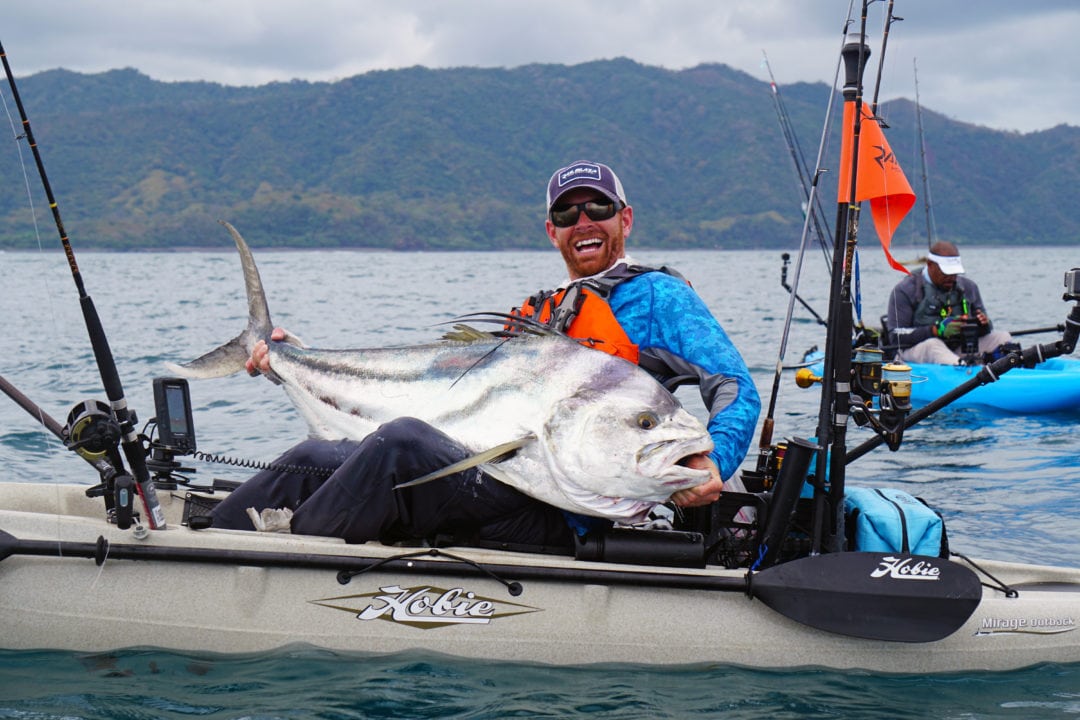
Rex to the rescue
It was Field’s good friend Rex DeGuzman who first introduced him to kayak fishing. An experience angler himself, DeGuzman saw how upset Field was and invited him to take a break and go fishing.
“I had this new perspective on life after my uncle’s passing, and Rex helped open my eyes to that,” says Field. “It’s crazy how perspective is everything, because these same circumstances that I thought were the end of the world suddenly forged the path to where I am now.”
Kayak fishing is exactly as it sounds—fishing from a kayak. What makes it so unique is that kayak anglers can get much closer to fish than those on the shore, and they can reach places that boats are either too large or too loud to access. Using similar techniques to both shore and boat fishing, the true skill of kayak fishing comes when a fish is hooked and the angler must not only reel it in but maintain a sense of balance while doing so—either by sitting or standing (the latter being much more challenging).
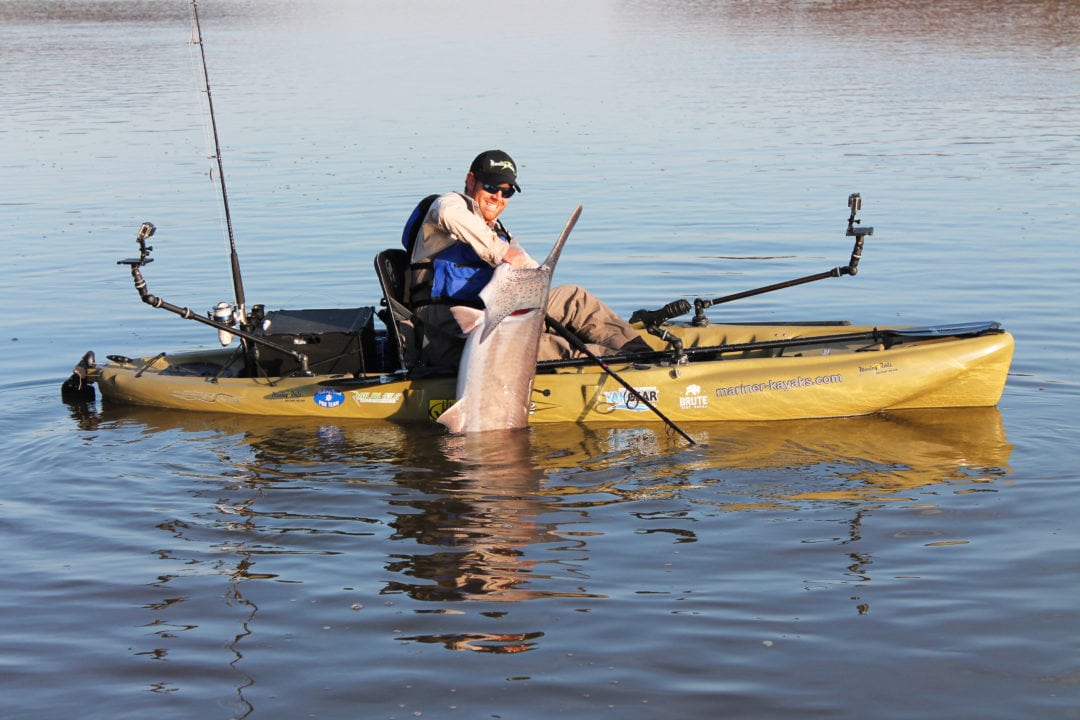
For someone who didn’t grow up shore or boat fishing, this new experience kick-started something deep within Field. He loved the extra effort it took to paddle somewhere, the quiet stillness of sitting in shallow water, and the sheer thrill of hooking your target. Much like his fish, Field was completely hooked.
Keys to success
Fast forward six years—a relatively short amount of time to become a professional angler—and Field has mastered the art of kayak fishing. Since that fateful day with DeGuzman, Field left his job in finance, sold most of his possessions, and moved into an RV. He has visited 49 states, caught thousands of fish, and launched a popular YouTube channel called Field Trips with Robert Field.
“So many people say, ‘God, I wish I could do what you do,’ and I say to them, ‘You can do it,’” Field shares. “Anyone can do what I’m doing, it’s just fear that holds people back—fear of failure, fear of the unknown, fear of taking a risk. But if you’re willing to just persevere and go for something that you’re passionate about, you can make it.”
In addition to pushing past his fears, there are a few other things that helped make Field so successful in such a short amount of time. For starters, he always makes a point to study the fish he’s going after and the ecosystems they live in.
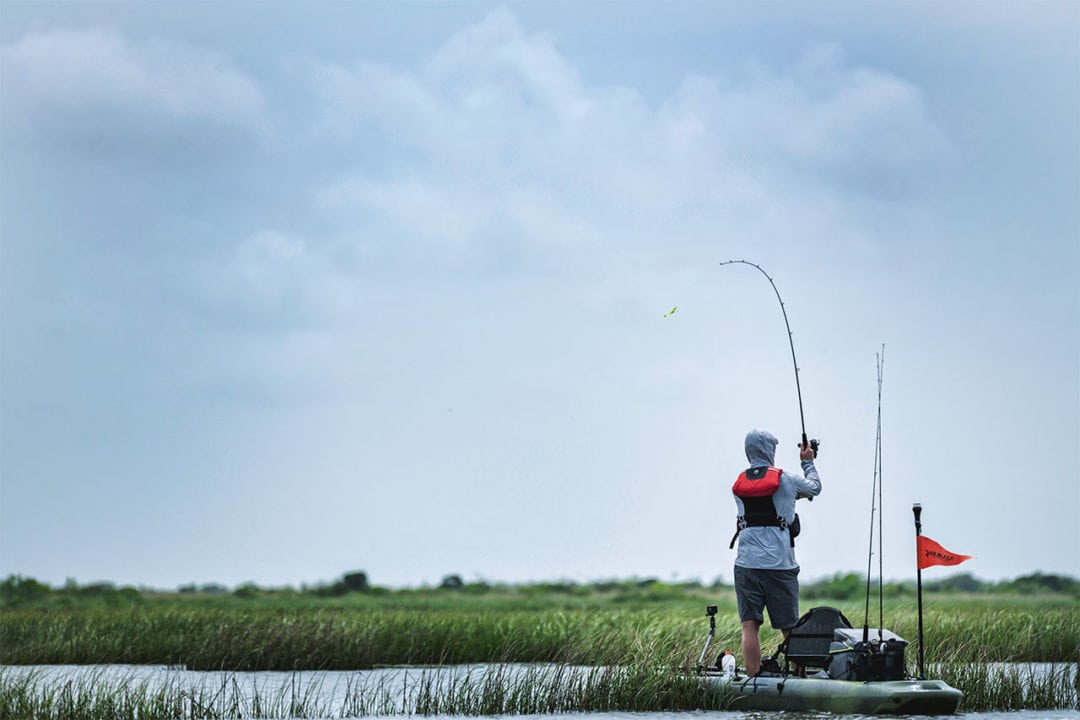
“I love the process of learning a new technique or a new area or a new species,” says Field. “I always joke that in order to be a good fisherman, you really have to become an amateur meteorologist, biologist, botanists, and geologist.”
Another element to his success is his unique living arrangement. Living and traveling in an RV allows Field to be extremely mobile and get very close to some incredible fishing spots. For example, in Louisiana, he found a small, secluded camping spot and was able to park four feet from the water, launching his kayak right out of the back of the RV.
The RV community
Field started full-time RVing in December 2017. He originally owned a small toy hauler, but found it hard to store all of his equipment and have enough room to sleep.
“I would put my kayaks in the living room, which in my head seemed like a great idea at the time,” says Field. “The problem was that it made it pretty much impossible to stop somewhere for the night. I would have to pull the kayaks out and put them on the ground outside in order to sleep.”
So, a few months ago, Field upgraded to a larger Keystone Cougar and now has much more living space. “What I love about the Cougar specifically is that there are two bunks in the back and I converted that bottom bunk to gear storage,” Field shares. “I have so much more room now.”
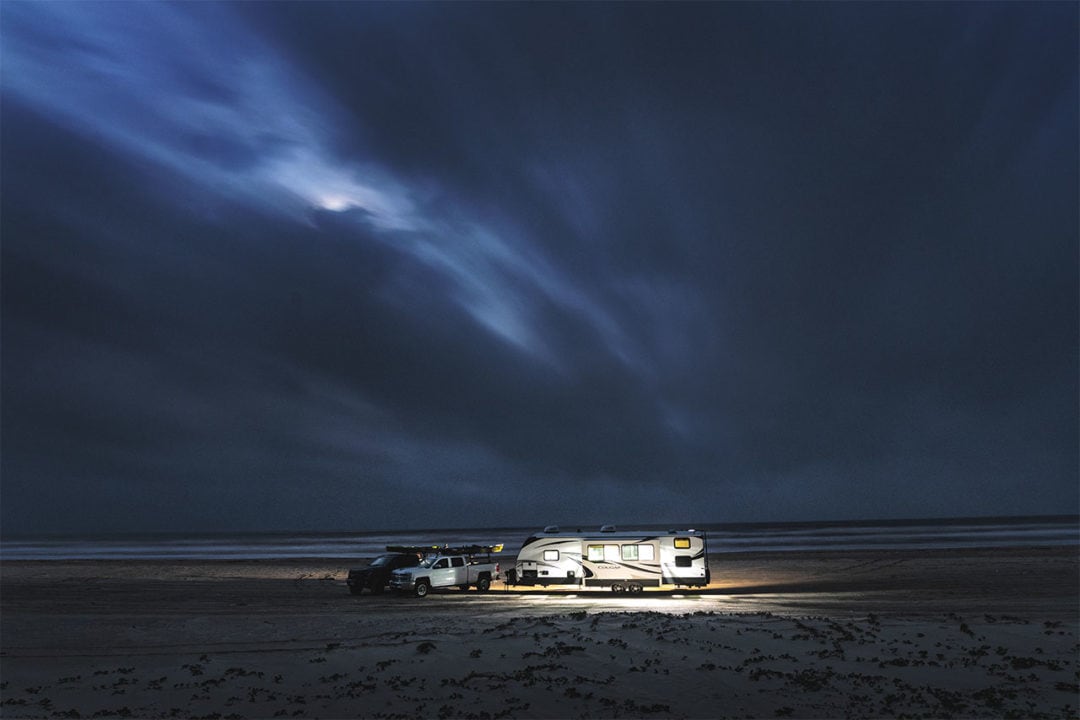
Convenience and space aside, there’s something else that really delighted Field about owning an RV: the community.
“When I was embarking on this journey, all of my thoughts were focused on all of the fish I was going to catch and the national monuments I was going to see,” says Field. “But so far, the most rewarding part of this whole experience is, without a doubt, the people I’ve met. The RV community is so welcoming. I’ve been blown away.”
Owning an RV has not only made it easy for Field to meet new people, but it has become a process he describes as unavoidable. In his experience, fellow RVers are always stopping by to ask about fishing conditions, offer a helping hand with set-up, or invite him over for a beer and a burger. This level of friendliness and openness has helped restore his faith in humanity and given him a sense of completeness, something he hadn’t felt since his uncle’s passing: “I’ve never been happier in my life.”
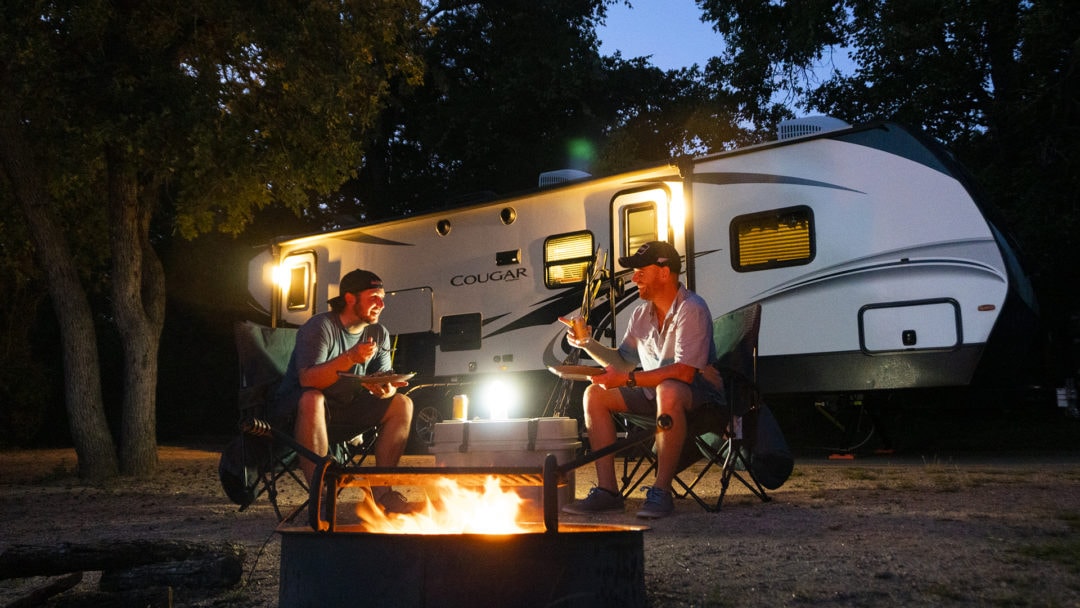
His personal Moby Dick
So, what’s next for this traveling angler? Other than continuing to explore unfamiliar bodies of water and hook species he’s never caught before, there is a bit of a Moby Dick-style quest for this modern-day Ahab—and that’s tarpon.
“There’s no hesitation, the tarpon is my arch nemesis,” Field says with a laugh.
Tarpon are extremely large, saltwater fish—some getting up to 250 pounds—that are known for their acrobatics. Once the fish is hooked (commonly known as “jumped”), they immediately jump out of the water in a full aerial display.
“I’ve jumped 14 tarpons but never landed a single one,” says Field. “This summer, I hope to get lucky on number 15.”
For someone who can sit in a kayak for hours and truly embody the art of patience, we hope he gets lucky, too.
Fish like Field
More Stories
Check out more stories from Robert Field on the Thor Industries website:
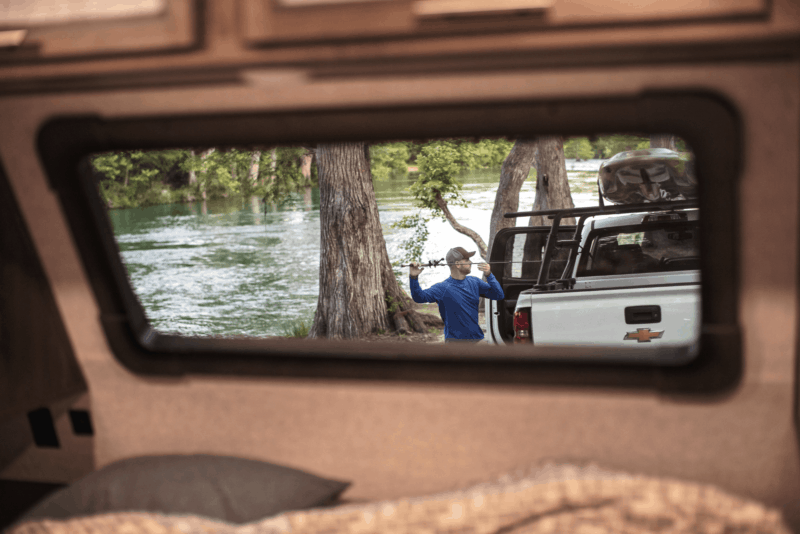
Check out this video where Field discusses ditching the 9 to 5 grind to pursue his passion for kayaking, fishing and videography.
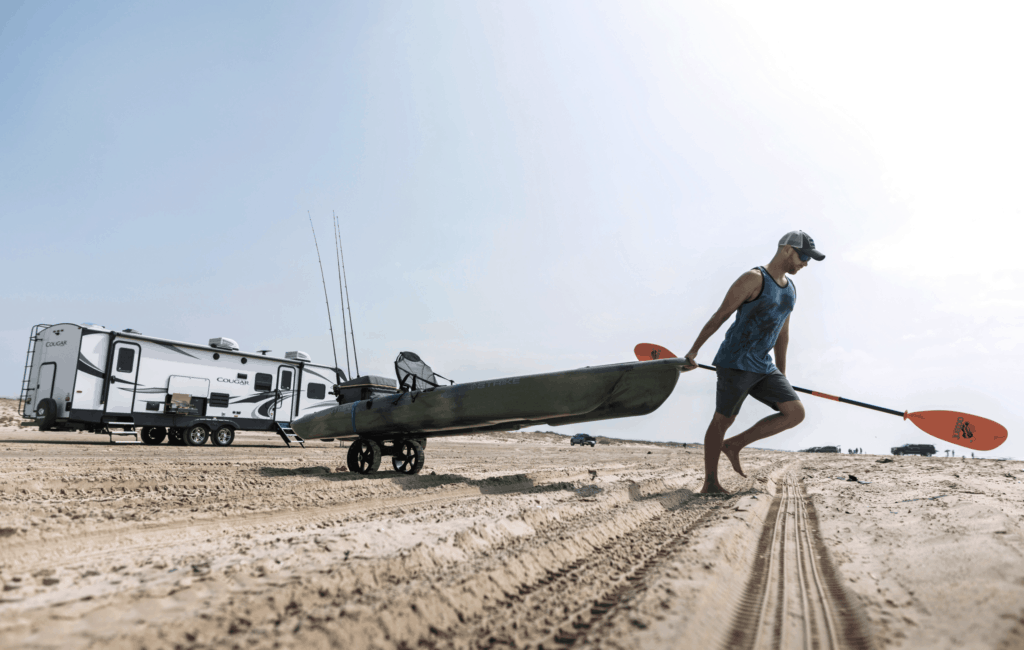
With so many incredible rivers, lakes, and miles of coastline, any angler can find what they love to do most somewhere in Texas.



